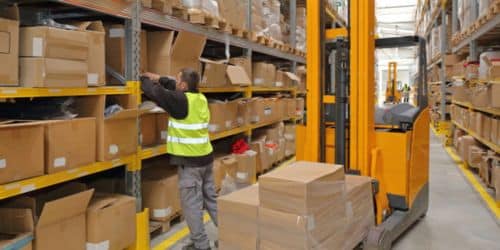Storage is one of the most important aspects of managing a company, and in the e-commerce market, it is a key step in the order fulfillment process. Small businesses with limited space may find it difficult to store their products. Large businesses, on the other hand, could use a fulfillment warehouse to store all of their products while regularly replenishing their stock. These are sizable industrial buildings with ample storage space for a lot of goods. These warehouses offer space for rent or lease that small businesses can use to store their goods. They store these goods securely and can ship them in large quantities if the client requests them. Fulfillment Warehouse by Amazon has a network that handles warehousing, order processing, picking, packing, and shipping for partners via its Fulfillment by Amazon (FBA) program. One of the key elements of a successful business is a practical and efficient order fulfillment strategy.
Fulfillment Warehouse
The storage of goods in a large structure known as a fulfillment warehouse is an essential step in the order fulfillment process. Fulfillment warehouses are large and have plenty of space for long-term storage of inventory in bulk, as well as a large staff and forklifts to assist with the process. They also have numerous facilities, including high shelves, that they require to safely store a substantial amount of inventory for a long time.
According to your needs and the needs of your business, you can either buy or rent a space in a fulfillment warehouse. Small business owners can typically save money by simply renting a space for a while. A fulfillment center is a kind of warehouse that handles the picking, packing, and shipping of merchandise for online or local B2B orders. Because of this, the procedure is known as “order fulfillment”. The supply chain’s final step is typically this one.
Fulfillment facilities make sure that shipments proceed according to your specifications. Usually, fulfillment centers handle the delivery of your customers’ orders.
Benefits of a Fulfillment Warehouse
If you store your inventory yourself, you won’t have access to the cutting-edge technology available in these warehouses. They are more prepared thanks to these modern features for inventory management, shipping, and storage.
#1. Safety
Fulfillment warehouses are essential for small businesses for several reasons, chief among them safety. Your inventory could be damaged or stolen if you attempt to store it on your own. Large fulfillment centers, however, have the personnel and equipment necessary to guarantee the security of your products. Additionally, they have high security to prevent any break-ins and product theft. Because your goods are in capable hands, you won’t need to worry.
#2. Maintain Reliable Inventory Management
The amount of inventory that is currently on hand and being sold in the present is crucial information. This sets off events, like setting up replenishment orders. Additionally, it avoids customers receiving out-of-stock messages and aids businesses in maintaining precise sales forecasts.
#3. Reduced Delivery Fees
Numerous fulfillment companies have a wealth of industry knowledge. Additionally, they might have several physical locations spread across various states or regions, all at key strategic points. This enables them to complete tasks for much less money than you would pay if you handled everything yourself.
#4. Experience
You can take advantage of your provider’s extensive experience in this field by outsourcing order fulfillment to a reputable fulfillment center.
These businesses can assist with timely and effective order fulfillment, as well as help you create more effective systems for managing and controlling your inventory. So that they can assist you in developing your business model and enabling growth.
#5. Lower Operating Expenses
Utilizing a fulfillment center can result in significant operating cost savings. Businesses can use their money to find a reputable 3PL provider by reducing costs associated with warehouse space and personnel.
#6. Space
Several of these limitations are lifted when you use an order fulfillment center. Remember that the materials required for packing and shipping, such as bubble wrap, boxes, and cartons, are just as important as the actual space available for the products themselves.
#7. Better Reach
You might only have a small market when your company first launches. If handling order fulfillment in-house, you could at first provide delivery to the entire state. Your ability to reach a wider audience is unrestricted by handing over control of your fulfillment procedures to an experienced fulfillment provider.
Drawbacks of A Fulfillment Warehouse
#1. Absence of Control
Making use of a fulfillment center entails outsourcing fulfillment. By definition, this implies that you have no control over the selection, packaging, or delivery of each order. It takes courage to relinquish that control.
You must have faith in the 3PL company you use for fulfillment outsourcing. Integrating systems and maintaining consistent communication can be helpful in this regard. The top fulfillment facilities will keep you regularly updated on order status changes and supply chain updates. You’ll feel more in control of the situation as a result.
#2. Service Quality
Utilizing a fulfillment center means you are entrusting the company in charge of it with a sizeable portion of your customer experience. Errors can degrade the experience.
Orders may be picked incorrectly by center personnel or they may be completely overlooked. You can be sure that doing this will enrage your clients. But if you also handle fulfillment in-house, these kinds of human error incidents could—and would—occur.
#3. Lack of Visibility
The best 3PL providers keep in constant communication with merchants, as we have already mentioned a few times. However, using a fulfillment center might lead to visibility problems without this ongoing communication.
You lose sight of orders and inventory if there aren’t regular updates and information coming from the fulfillment center. This could indicate that you are unable to properly update a customer on the status of their order or even that you are overselling goods that you don’t have in stock. Any retailer wants to stay away from these situations.
Order Fulfillment Warehouse
Order fulfillment is the act of receiving, packing, shipping, and delivering an order to a customer. Due to the numerous distinctive nuances of each organization, there isn’t a general strategy that works for all businesses. Order processing, order picking, order packing, shipping or arranging shipping for customer orders, and, if necessary, handling returned goods are all parts of the order fulfillment process.
Some businesses handle all aspects of fulfillment in-house, while others are so big that a third-party logistics (3PL) provider is required to carry some of the load. Despite this, regardless of the size of the business, a product must go through the same steps before reaching fulfillment:
#1. Receiving
Smaller businesses typically receive and store their inventory, but larger businesses can outsource this work to third-party logistics (3PL) companies.
#2. Storage
Keeping storage well-organized and accessible is essential for a seamless fulfillment process. Order delays and errors are frequently brought on by an unorganized warehouse. Processing entails receiving a customer order and starting the processes required to complete it.
#3. Picking
The item needs to be removed from its storage location and set up for shipping, whether it is done by a person or a robot. Products are assembled into separate shipments and packaged for transit.
#4. Shipping
After leaving the storage facility, the package is delivered to the customer using one of several different modes of transportation.
#5. Returns
Customer returns are an option; fulfillment continues after packages are shipped. Order fulfillment strategies that are effective must treat returns with the same consideration as sending the original product.
Fulfillment Warehouse Amazon
An Amazon fulfillment center is a warehouse where new orders are taken, processed, packaged, and delivered to customers. Sellers who use FBA (Fulfillment by Amazon) keep their stock in Amazon’s warehouses. Sellers who use Amazon’s platform must adhere to the company’s policies regarding product packaging and delivery. On behalf of FBA sellers, the Amazon fulfillment warehouse take orders, pack items, ship packages, offer customer support, and manage returns. The size, weight, and quantity of units of the package all affect the FBA fulfillment costs. If you want to use an Amazon fulfillment warehouse for your business, you need to create an Amazon seller account and send products there using that account. Once you’ve chosen a shipping option, packed your products, and sent them to one of Amazon’s designated fulfillment centers (using a carrier of your choice), your products can be shipped to one of their facilities.
The Amazon Fulfillment warehouse handles the pick, pack, and ship phases of the order fulfillment process, which are designed to deliver purchased goods to customers. Amazon sellers will have the ability to combine inventory management under the Amazon brand, including purchases, storage, distribution, and order fulfillment.
Items that are prohibited from Amazon Fulfillment Warehouse
- Items that have an expiration date.
- Dangerous goods include all high hazmat goods levels 3, 5, and 6, as well as any hazardous material that FBA forbids.
- Jewelry, clothing, accessories, watches, expensive items, Amazon devices, gift certificates, and groceries are excluded from the promotion.
- Size restrictions: There are size and weight restrictions for cartons: they can’t be more than 50 pounds and 25 inches long by 25 inches wide by 36 inches high. At the same time, each SKU inside the carton should be no larger than 18 inches long, 14 inches wide, and 8 inches high, and it should weigh no more than 20 pounds.
Fulfillment Warehouse Jobs
These facilities require fit individuals to work there. When your job requires you to run around a facility all day, staying fit is essential. People who work in fulfillment warehouses must frequently stand on their feet, so they must be in good physical condition. To routinely pack, store, and shelf products, you must also have a great deal of flexibility and mobility.
Additionally, employees in a fulfillment warehouse require good hand-eye coordination. Care must be taken when handling every package that enters these facilities because clumsy handling could harm the goods. You need to have excellent hand-eye coordination, especially if you operate a forklift truck, to move and position goods correctly without causing a commotion or an accident inside the building.
Working in a warehouse requires a lot of interpersonal interaction. The capacity of a team to collaborate and operate effectively under pressure is essential. Interpersonal, teamwork, and collaboration skills are highly valued in a fulfillment warehouse position.
Reading comprehension is a requirement for any job in a warehouse, even stocking products. Therefore, having some literacy skills is required if you want to work in a fulfillment warehouse.
What Is the Difference Between a Warehouse and a Fulfillment Center?
The main purpose of fulfillment warehousing is long-term storage. If you rent a warehouse, you can keep your stock there as long as you like. They have the necessary facilities to keep a variety of items for a long time. Contrarily, merchandise is only temporarily stored at fulfillment centers.
The use of fulfillment centers allows for the timely packaging, shipping, and storage of goods. The majority of the shipping process takes place at fulfillment centers when a merchant hires a fulfillment specialist for fulfillment services. Consequently, fulfillment centers stock, package, and send a range of orders. There is little activity in fulfillment warehouses. It merely accepts and holds the goods until the merchant again transfers them out. Despite the large amount of inventory they receive and the length of time they are stored, they only need to occasionally check on them.
They choose the products, put them together, package them, label them properly, send out the orders, and most importantly, take care of all the returns that are sent back to them.
What Does a Fulfillment Service Do?
A third-party warehouse that fulfills your orders for you by packing and shipping them is known as a fulfillment service. If you don’t want to fulfill and ship orders yourself or if your business has expanded past the point where your current warehousing capacity no longer allows you to ship items manually, using a fulfillment service is a great option. An outside warehouse known as a fulfillment service picks, packs, and ships your orders on your behalf.
What Is Fulfillment vs Distribution?
Consumer orders are processed at fulfillment centers and sold. Assorted recipient warehouses receive the goods from distribution centers. A distribution center’s fundamental duty is to take in materials from outside sources. Pallets or floor-loaded containers are used to transport materials. Documenting and categorizing all incoming materials is the distribution center’s responsibility. This will enable them to be delivered to their correct location, such as a fulfillment center or big-box retailer, and Every fulfillment center’s main function is picking and packing. In response to customer orders, the fulfillment center creates pick lists for each item. After that, a warehouse worker selects the items from the orders. Finally, additional warehouse staff assembles the items into a box, which is then shipped to the customer.
Due to the warehouse locations’ proximity to customers, fulfillment centers are the best options for online retailers. For manufacturers looking to expand their retail or wholesale customer bases or position their products closer to end users, distribution centers are a useful resource.
What Is an Example of a Fulfillment Warehouse?
In other words, your fulfillment center is where a third-party logistics (3PL) provider stores and processes online orders for e-commerce merchants. One such example is the operation of fulfillment centers by Amazon to complete online orders for Amazon sellers.
Is Amazon Fulfillment Center the Same as Amazon Warehouse?
The responsibility for completing customer orders falls on Amazon fulfillment centers. In other words, Amazon warehouses serve as both product storage facilities and distribution hubs where staff members quickly and effectively pick, pack, and ship orders.
How Does Amazon Fulfillment Center Work?
Fulfillment by Amazon, or FBA for short, is a fulfillment service that enables Amazon sellers to outsource their shipping to Amazon. The products are stored, picked, packed, shipped, and delivered to customers by Amazon using this e-commerce fulfillment option. Amazon handles these orders in terms of customer support and returns.
Conclusion
If a small or medium-sized business is starting and needs to store a lot of goods, fulfillment warehouses are a great option. They have excellent technologies that enable them to simultaneously store, ship, and track a large number of products. They are also more secure than most other storage options.
Fulfillment warehouses are the best choice if you want to store your goods for a longer period in a secure location. They have a lot of connections and can assist small and medium-sized businesses with the storage and delivery of their goods. For many businesses that sell products, fulfilling orders is an essential business function.
To fulfill orders effectively, it is necessary to coordinate with numerous departments and outside partners.
Related Articles
- WAREHOUSE MANAGEMENT: Meaning, Systems, Salary & Courses
- WHAT IS FULL-TIME EQUIVALENT: What It Is & How It Is Calculated
- FULFILLMENT CENTER: Meaning And Its Benefit To Small Businesses
- WHAT IS AMAZON FBA? How It Works (Detailed Guide!)
- LOGISTICS MANAGEMENT: Definition and Types






